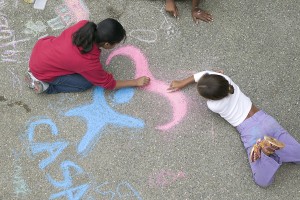Child advocacy group seeks to shore up funding
Kris Verhage — August 19, 2015
Court -Appointed Special Advocates (CASA) in Kendall County work on behalf of the county’s juvenile court system to gather information and make recommendations to help the judge act in a child’s best interests. (Photo: CASA Kendall County)
Cathi Mundsinger says she can be a nag at times.
But it’s for a good reason: She wants to ensure that an abused or neglected child’s voice is heard loud and clear and a judge has the information she needs before making decisions regarding that child.
Mundsinger is one of nearly 40 volunteer Court -Appointed Special Advocates (CASA) in Kendall County. They work on behalf of the county’s juvenile court system to gather information and make recommendations to help the judge act in a child’s best interests.
“I am the eyes and ears of the judge and the voice of a kid,” Mundsinger said.
CASA Kendall County serves 65 children, or 100 percent of the neglect/abuse cases in the county, said CASA Executive Director Christine G. Weber.
But providing this service could prove more difficult if the nonprofit organization isn’t able to pull itself out of a funding slump.
CASA Kendall County has made a summer appeal for donations, Weber said.
“We are at an extremely critical time,” she said.
The Kendall County Board’s finance committee recently turned down a $40,000 request by CASA, citing the county’s own budget constraints. Last year, it granted the group $20,000 from contingency funds and continues to provide office space rent free in the county’s Health and Human Services Building in Yorkville, Weber said.
Weber said the organization sought $40,000 because, otherwise, the county would have to pay an attorney $150 an hour to serve as a guardian to a child in the juvenile court system. Federal law requires juvenile courts to assign a guardian to every child who enters the juvenile court system.
CASA Kendall County receives no state or federal money. It is funded by individual and corporate donations, as well as financial support from numerous community organizations. It also hosts a number of fundraisers.
Dissolving the organization isn’t an option, Weber said. CASA Kendall County has successfully dealt with funding setbacks throughout its 17-year existence, she added.
The part-time staff consists of Weber and Jennifer Gilbert, director of advocate services. They and the organization’s board of directors are looking at creating a revenue source the organization can annually count on, Weber said.
She said they’re considering offering partnership agreements with community groups or businesses that would pledge to donate a set amount of funding annually for a certain number of years.
While securing funding is important, the organization’s first priority is helping children, she said.
The goal is to return kids to their homes, whenever possible.
“Every child deserves the right to a nurturing home,” she said.
But during what can be an uncertain, confusing time in which a child is moved between home and possibly multiple foster homes, a CASA advocate is often the only consistent adult in that child’s life, Mundsinger and Weber say.
A girl Mundsinger has worked with during the last four years has lived in six foster homes, attended five high schools and has had multiple caseworkers. That’s resulted in lost belongings and paperwork and forgotten counseling efforts, Mundsinger said.
So it’s Mundsinger who asks where the girl’s boots are and schedules meetings with school officials. She also advocates for the girl’s medical and social needs.
Mundsinger takes her work seriously, treating the trust she’s earned from a child (and in many instances, the family) “very carefully,” she said.
“I sometimes find myself advocating for the parent,” Mundsinger said, adding she’s worked with a family to uncover financial abuse and helped reunite a father and child.
Becoming an advocate
CASA volunteers come from all walks of life. They don’t have to have experience working with children; they just need to be at least 21 years old, have empathy and a desire to help children.
Volunteers receive 30 hours of initial training and 12 hours of continuing education annually. Volunteer hours typically range between 15 and 20 hours a month. That time is spent meeting with children and their families, schools, doctors, therapists and caseworkers. They also submit reports to the judge and attend court hearings.
Mundsinger, a retired educator from Oswego, became an advocate after retiring from Oswego Community Unit School District 308 about five years ago.
She likens being an advocate to riding a roller coaster. She’s worked with children who’ve entered the court system under heartbreaking circumstances.
“I sometimes wish I didn’t know their story,” she said.
Sometimes a child’s progress makes her “wildly optimistic” she said. Then there are some days she reminds herself to see the big picture. If a child is having a rough month, she’ll remember the progress that child has made over the course of a year.
For more information about CASA Kendall County, call (630) 553-8660 or visit casakendallcounty.org.
Three fundraisers are set to benefit CASA Kendall County this fall.
- Happy Hands Mitten Sale at the Oswego Farmers Market – 9 a.m. to 1 p.m. Sept. 20, Main Street; 100 percent of sales to be donated to CASA Kendall County.
- Play for the Kids, a new charity softball tournament that organizers plan to make an annual event – Sept. 27, American Legion Post 489; contact Christine Weber at (630) 234-5872 or Cgweber@co.kendall.il.us for more information.
- Wine tasting – Oct. 29; more details to come.
— Child advocacy group seeks to shore up funding —



